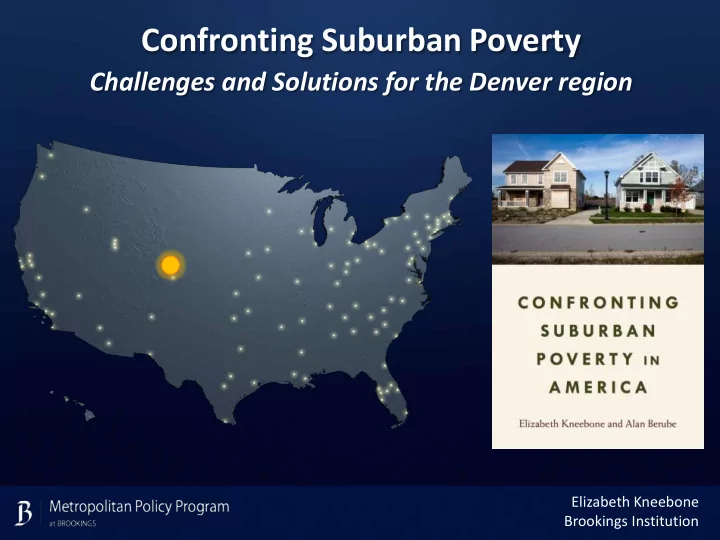

Confronting Suburban Poverty Challenges and Solutions for the Denver region Elizabeth Kneebone Brookings Institution
Since 2009, the Metropolitan Opportunity Series has tracked the changing geography of poverty and opportunity in nation’s largest metro areas Seattle Detroit Cleveland Chicago SF Bay Area Denver Pittsburgh Washington DC LA-Riverside Atlanta Houston
The geography of poverty and 1 opportunity has changed Current policies are not aligned 2 to this new geography We need a new agenda for 3 metropolitan opportunity
The geography of poverty 1 and opportunity has changed
Today, more poor residents live in suburbs than in cities Suburbs Cities 18,000,000 16,000,000 14,000,000 12,000,000 10,000,000 8,000,000 6,000,000 4,000,000 2,000,000 1970 1980 1990 2000 2012 Number in poverty, 1970-2012. Source: Brookings analysis of U.S. Census Bureau data
The number of poor residents in the metro outside of Denver and Aurora grew by 131 percent between 2000 and 2012 Source: Brookings analysis of U.S. Census Bureau data
Several factors drive the changing geography of poverty Population Change Immigration Housing Job Location Regional Economy
Suburban poverty brings added challenges Strained Local Services Transit Access Change in School Populations Limited Philanthropic Resources
Current policies are not aligned 2 to this new geography
The legacy system of place-based anti-poverty programs does not map easily onto the suburban landscape $82 billion 81 federal programs 10 agencies
Suburbs face additional challenges Lack of Capacity Extensive Fragmentation Inflexible, Unreliable Funding
We need a new agenda for 3 metropolitan opportunity
Yet innovators across the country are finding creative ways to navigate this system
Regional innovators are making limited resources stretch further to help more people and places by finding ways to: Achieve Scale Collaborate and Integrate Fund Strategically
How can regional leaders in Denver promote these kinds of strategies by: Streamlining systems and networks Achieve Scale Working with high-performance organizations Supporting smart consolidation Reducing barriers Collaborate and Integrate Rewarding these approaches Building regional capacity Moving toward enterprise-level funding Fund Strategically Using tools that leverage public & private resources Collecting and analyzing data to drive decisions
Creating a Metropolitan Opportunity Challenge could help bring these solutions to scale in regions across the country Federal Place-Based Anti-Poverty Programs $82 Billion; 81 Programs; 10 Agencies Re-purpose 5% : $4 billion
You can read more about the Metropolitan Opportunity Challenge and the contents of the book on our new website www.ConfrontingSuburbanPoverty.org
The website provides a host of helpful resources: Profiles of the top 100 metros Case studies of innovators Tips for taking action Video Infographic
ekneebone@brookings.edu
Recommend
More recommend